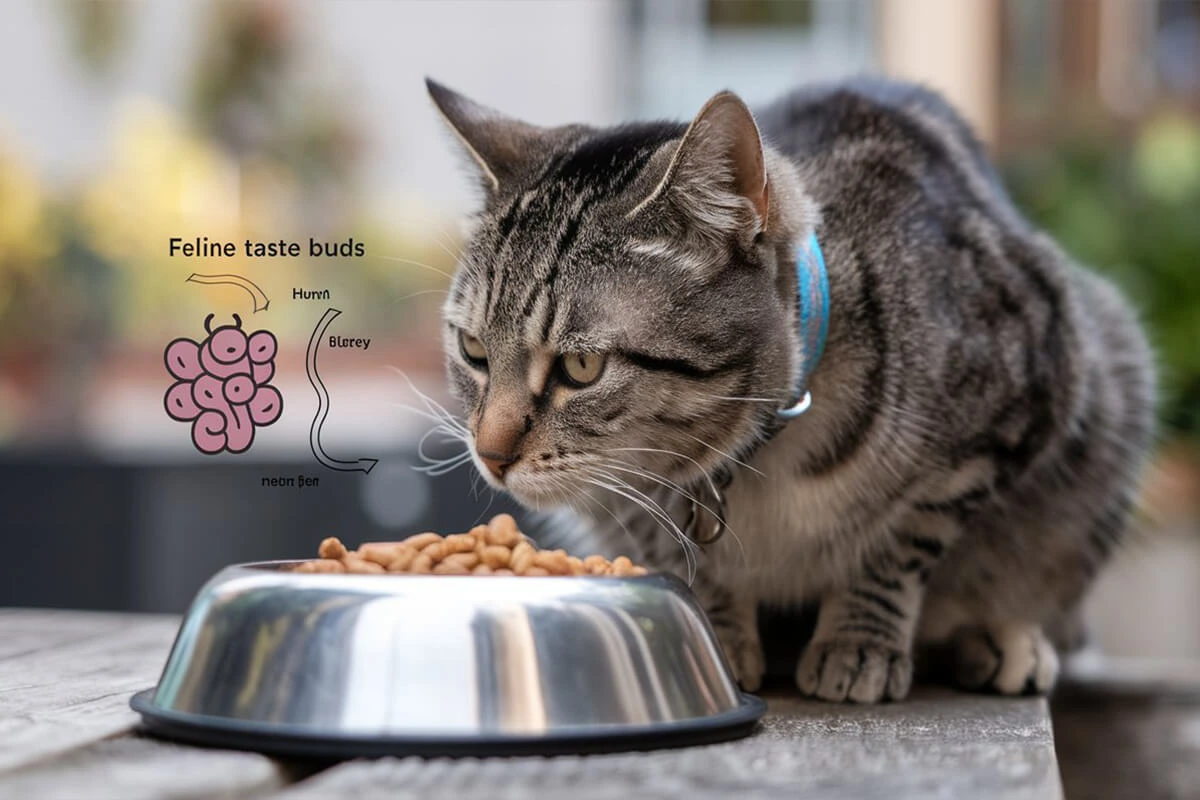Cats are naturally curious creatures, often sniffing around and even attempting to steal bites from their owners’ meals. This curiosity raises an interesting question: can cats taste spicy food? Many pet owners have noticed their cats showing interest in foods with strong aromas, including spicy dishes. But do cats actually experience the heat of spicy food the way humans do, or is their reaction based on something else?
Understanding how cats perceive flavors can be surprising, especially since their taste buds work differently from ours. Unlike humans, who enjoy a wide range of tastes, including sweetness and spiciness, cats have a much more limited sense of taste. Some cat owners assume that their feline friends might enjoy the kick of spicy food, but the reality is far more complex.
In this article, we’ll uncover five surprising facts about cats and spicy food. We’ll explore how their taste buds function, whether spicy foods pose a danger to them, and why some cats seem attracted to foods they shouldn’t eat. If you’ve ever wondered whether it’s safe for your cat to have a taste of your spicy meal, keep reading to find out the truth!
Fact #1: Cats Have Different Taste Buds Than Humans
How Cats Taste Food
Cats experience food differently than humans because their taste buds are not as developed. While humans have around 9,000 taste buds, cats only have about 470. This means their ability to detect flavors is much more limited. Unlike humans, who can taste sweetness, saltiness, sourness, bitterness, and umami, cats completely lack sweet taste receptors. Since their bodies evolved as strict carnivores, their taste buds are designed to detect meat-based flavors rather than plant-based or sugary ones.
When a cat eats, it relies more on smell than taste. A cat’s sense of smell is far superior to that of humans, and this plays a major role in how they choose their food. If something has a strong aroma, a cat might be curious about it, but that doesn’t mean it enjoys the taste. This is why cats often seem interested in human food but quickly lose interest after a sniff or a small lick.
Cats and Spicy Food Sensitivity
Since cats have fewer taste buds and lack sweet receptors, they also do not process spicy flavors the way humans do. Spiciness isn’t actually a taste—it’s a pain response triggered by capsaicin, the active compound found in chili peppers. When humans eat spicy food, capsaicin binds to pain receptors in the mouth, creating a burning sensation.
Cats also have these pain receptors, which means they can feel the heat of spicy food, even if they can’t truly “taste” it the way we do. However, since their taste system is different, they might not be as immediately sensitive to the heat as humans are. Instead, the discomfort might come later, once the spice starts irritating their mouth, throat, or digestive system.
Do Cats Like Spicy Food?
Some cats show interest in spicy food, but their attraction is likely due to the strong smell rather than the taste. Spicy dishes often contain ingredients like meat, broth, or fats that appeal to a cat’s carnivorous instincts. If a cat smells chicken, beef, or fish in a spicy dish, it may try to eat it, not realizing that the spice itself could cause discomfort.
Another reason some cats may appear to like spicy food is the warmth of the dish. Cats often seek out warm food because it mimics the temperature of freshly caught prey. If a spicy dish is served warm, a cat might be more interested in it for that reason alone.
Despite this curiosity, eating spicy food can be an unpleasant and even painful experience for cats. While some may take a small lick and walk away, others might eat enough to experience irritation in their mouth, throat, or stomach. For this reason, it’s best to keep spicy foods out of reach and avoid offering them to your feline friend.
Fact #2: Capsaicin in Spicy Food Can Affect Cats Differently
What Is Capsaicin?
Capsaicin is the active compound responsible for the heat in spicy foods like chili peppers. It binds to pain receptors in the mouth and throat, triggering a burning sensation. In humans, this heat can range from mildly warm to intensely painful, depending on the amount of capsaicin in the food.
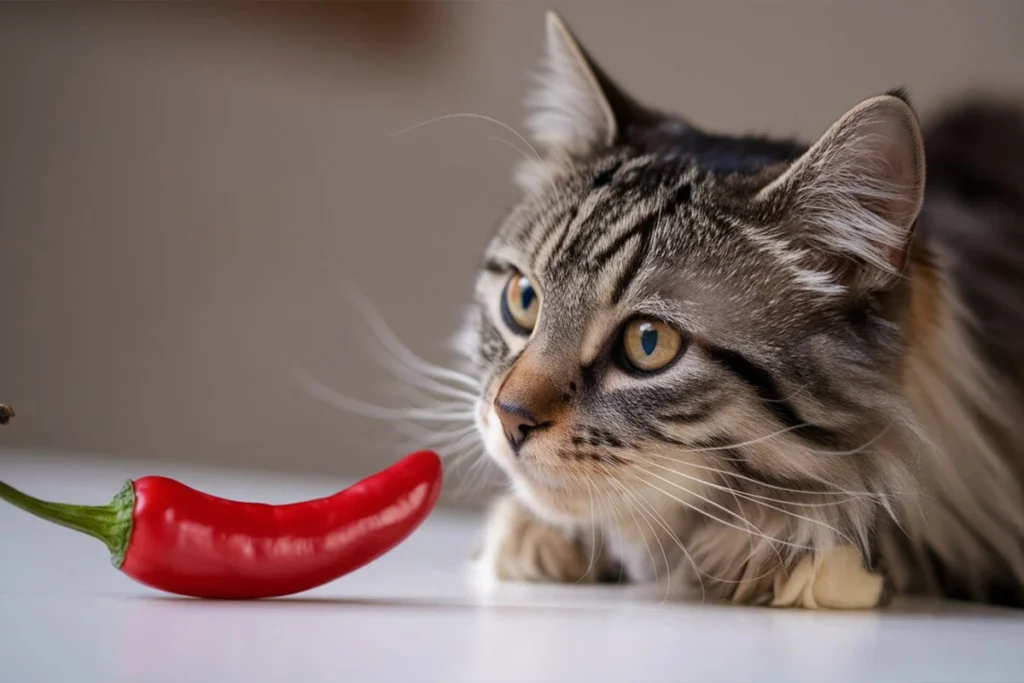
While people sometimes enjoy the thrill of eating spicy food, cats do not process capsaicin in the same way. Their taste buds do not recognize the flavor of spice, but their pain receptors still react to it. This means that even if a cat cannot “taste” spiciness the way humans do, it can still feel the burning sensation that capsaicin causes.
Capsaicin is not just present in chili peppers—it can also be found in spicy sauces, seasonings, and even some processed foods. Since cats have a sensitive digestive system, consuming even a small amount of capsaicin can cause discomfort and irritation.
Are Spicy Foods Safe for Cats?
Spicy foods are not safe for cats and should always be kept out of their reach. While a small lick of something mildly spicy might not cause serious harm, anything containing capsaicin can lead to unpleasant symptoms. Cats have delicate digestive systems that are not equipped to handle spicy or heavily seasoned foods.
Many spicy dishes also contain ingredients that are toxic to cats, such as garlic, onions, and certain spices. Even if a cat doesn’t eat enough to experience severe toxicity, these ingredients can still cause stomach upset, irritation, and discomfort. Dairy-based spicy foods, like spicy cheese sauces or curries, can be even worse since most cats are lactose intolerant.
If a cat consumes spicy food, it may experience symptoms like excessive drooling, watering eyes, pawing at the mouth, or refusing to eat. Some cats might even try to drink a lot of water in an attempt to soothe the burning sensation. Although spicy food is not always life-threatening, it is certainly not a safe or comfortable experience for a cat.
What Happens If a Cat Eats Spicy Food?
If a cat eats spicy food, the immediate reaction will depend on how much capsaicin is present and how sensitive the cat is. Some cats might take a single lick and walk away, while others might consume enough to cause noticeable discomfort.
Common reactions include:
- Mouth irritation: A cat may paw at its mouth, drool excessively, or show signs of distress.
- Eye and nose irritation: Capsaicin can cause watery eyes, a runny nose, or sneezing if inhaled.
- Digestive upset: Spicy food can lead to vomiting, diarrhea, or stomach pain. Since a cat’s digestive system is not built for spicy or heavily seasoned foods, even a small amount can cause discomfort.
- Loss of appetite: Some cats may refuse to eat for several hours after consuming something spicy, as their stomach recovers from the irritation.
If a cat accidentally eats spicy food, offering plenty of fresh water can help ease the irritation. However, if the cat shows severe symptoms such as persistent vomiting, extreme distress, or difficulty breathing, a vet visit may be necessary. To prevent any issues, always keep spicy foods out of your cat’s reach and avoid offering them any human food that contains strong spices.
Fact #3: Spicy Foods May Cause Digestive and Health Issues
Cat Digestive System and Spicy Food
A cat’s digestive system is designed for processing meat, not heavily seasoned or plant-based foods. As obligate carnivores, cats have short digestive tracts that efficiently break down proteins and fats from animal sources. Unlike humans, who have enzymes capable of digesting a variety of foods, cats lack the necessary enzymes to process many plant-based compounds, including those found in spicy food.
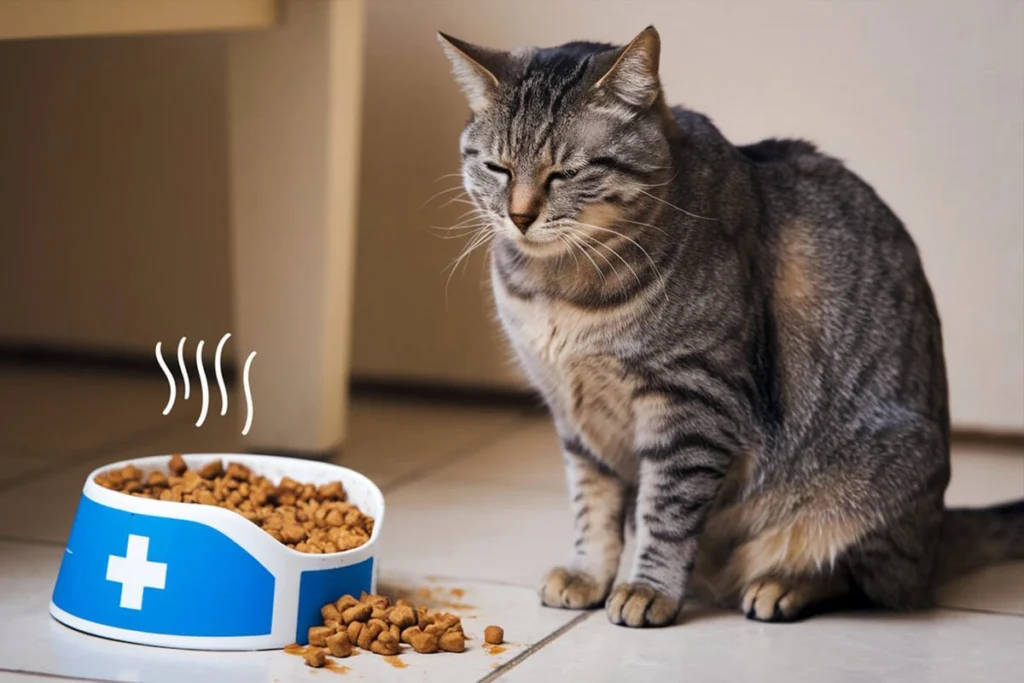
When a cat eats spicy food, its body struggles to break down the complex seasonings and capsaicin. Instead of being processed smoothly, these ingredients can cause irritation and discomfort as they move through the digestive tract. This is why even a small amount of spicy food can lead to stomach upset, vomiting, or diarrhea in cats.
Additionally, many spicy dishes contain oils and fats that can be difficult for cats to digest. High-fat foods, such as spicy meats or fried dishes, can lead to gastrointestinal distress or even more serious conditions like pancreatitis. Because their digestive systems are so sensitive, it’s best to keep spicy foods away from cats entirely.
Cat Health Risks from Spicy Foods
Feeding a cat spicy food can lead to several short-term and long-term health risks. While some cats might only experience mild discomfort, others can suffer from severe reactions, depending on the ingredients in the dish.
Common health risks include:
- Mouth and throat irritation: Capsaicin can cause a burning sensation, leading to excessive drooling, pawing at the mouth, and general discomfort.
- Gastrointestinal upset: Spicy food often leads to nausea, vomiting, diarrhea, and abdominal pain in cats.
- Dehydration: If a cat experiences vomiting or diarrhea, it may lose fluids rapidly, increasing the risk of dehydration.
- Respiratory issues: Strong spices can irritate a cat’s nose and throat, potentially causing sneezing, coughing, or difficulty breathing.
- Pancreatitis: Fatty, spicy foods can trigger inflammation of the pancreas, leading to a painful and potentially serious condition.
In addition to these risks, spicy foods often contain ingredients like onions, garlic, and chives, which are toxic to cats. Even small amounts of these ingredients can damage a cat’s red blood cells and lead to anemia, making them extremely dangerous.
Is Spicy Food Toxic to Cats?
Spicy food itself is not always toxic to cats, but many of the ingredients commonly found in spicy dishes can be. The main danger comes from capsaicin, which causes irritation and discomfort, and additional seasonings that could be harmful or even deadly.
Toxic ingredients commonly found in spicy foods include:
- Garlic and onions: These are highly toxic to cats and can cause anemia and digestive issues.
- Salt and spices: Too much salt can lead to sodium poisoning, while certain spices can be irritating or harmful.
- Dairy-based sauces: Many spicy dishes include dairy, which can cause stomach upset since most cats are lactose intolerant.
Even if the spicy food itself doesn’t contain toxic ingredients, the discomfort and digestive distress it causes make it an unsafe choice for cats. If a cat accidentally eats something spicy, monitoring for symptoms like vomiting, excessive drooling, or difficulty breathing is important. If severe reactions occur, contacting a veterinarian is the best course of action.
To keep cats safe, it’s best to avoid giving them any human food that contains strong spices, seasonings, or unknown ingredients. Instead, offering cat-friendly treats and a proper diet designed for feline health will ensure they stay happy and healthy.
Fact #4: Some Cats Are Attracted to Spicy Food for Unusual Reasons
Cat Behaviors Around Human Food
Cats feel naturally curious about human food, and their strong sense of smell makes them eager to investigate different scents. This curiosity often leads cat owners to wonder, can cats taste spicy food? While cats cannot detect spice the way humans do, they still react to the strong aromas of certain foods. When a cat watches its owner eat, it responds to the scent rather than the actual food. Strong-smelling foods like fish, meat, or seasoned dishes quickly grab a cat’s attention, making it seem like the cat wants to share the meal.
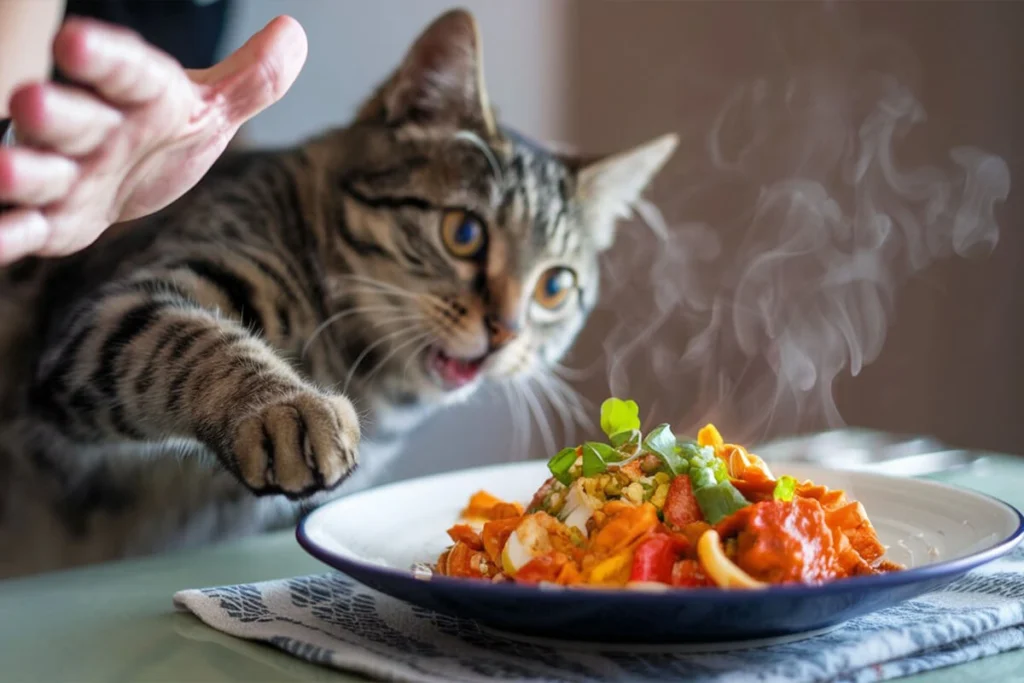
Many cats beg for human food because they associate mealtime with receiving treats. If an owner regularly offers small bites, the cat learns to expect food whenever people eat. Even if the meal includes spices, the cat does not crave the spice itself. This learned behavior can make it seem like a cat enjoys spicy food, but in reality, it just wants a reward. This further raises the question, can cats taste spicy food? The answer remains no—cats lack the taste receptors for spice, but they still experience the burning sensation caused by capsaicin.
Warm food also attracts cats because they instinctively prefer meals that resemble freshly caught prey. Cooked or heated food releases stronger scents and feels more natural to a cat. If a spicy dish gives off an appealing aroma and warmth, a cat may show interest. However, this curiosity comes from the smell and temperature of the food, not a true preference for spice. So, if you ask, can cats taste spicy food? the answer is clear—they cannot, but they can still suffer the consequences of eating it.
Strong Smells vs. Taste
Cats rely on their sense of smell far more than their sense of taste when choosing what to eat, which often leads cat owners to wonder, can cats taste spicy food? Their noses contain around 200 million scent receptors, while humans only have about 5 million. This incredible sense of smell helps cats detect food from a distance and decide whether something is worth eating.
Because cats have fewer taste buds than humans, they don’t experience food the same way we do. While people can detect a wide range of flavors, cats depend more on smell to determine what they enjoy. This is why some cats seem interested in spicy food—it’s not the spice itself that attracts them but the strong, meaty aroma of the dish. However, even if a cat appears curious, it doesn’t mean it can taste or tolerate spice.
Just because a cat sniffs at a spicy meal doesn’t mean it will enjoy eating it. Can cats taste spicy food? No, but they can still react negatively to it. In many cases, a cat may take one lick or bite and immediately back away, showing signs of discomfort. Some cats may sneeze, shake their heads, or drool after getting a whiff of something overly spicy, proving that their interest was driven by scent rather than taste. Since spicy food contains capsaicin, which causes irritation, feeding it to cats can lead to unpleasant reactions and digestive issues.
Do Cats Like Spicy Food for the Heat or the Aroma?
Cats do not like spicy food for the heat, because they do not experience the thrill or excitement that some humans associate with eating spicy dishes. Capsaicin, the compound responsible for spiciness, activates pain receptors rather than taste buds, which means that when a cat eats spicy food, it feels irritation rather than enjoyment. Unlike humans, who may enjoy the burning sensation of spice, cats have no reason to seek out this kind of discomfort.
If a cat seems interested in spicy food, it is likely because of the food’s aroma. Many spicy dishes contain meats, broths, or fatty ingredients that smell appealing to a cat. The cat may try to take a bite simply because it recognizes the scent of something it would normally eat. However, once it experiences the heat of the spice, it may quickly lose interest or react with discomfort.
Some cats may also be drawn to the warmth of spicy dishes, mistaking them for freshly cooked meat. Warm food mimics the temperature of prey, making it naturally more appealing. However, once a cat realizes that the food contains irritating spices, it will likely avoid it in the future.
To keep cats safe and comfortable, owners should avoid giving them any spicy foods and instead offer treats specifically designed for feline diets. While cats may be curious about human food, their digestive systems and taste preferences are very different from ours, making it important to stick to meals that meet their nutritional needs.
Fact #5: Veterinary Advice on Cats Eating Spicy Food
Veterinary Warnings on Spicy Foods
Veterinarians strongly advise against feeding spicy foods to cats because their bodies are not designed to handle them. While a small lick of something mildly spicy may not cause serious harm, anything containing capsaicin or strong seasonings can lead to discomfort and health issues. Capsaicin, found in chili peppers and spicy seasonings, triggers a burning sensation that affects cats just as it does humans, but cats have no ability to enjoy or tolerate it.
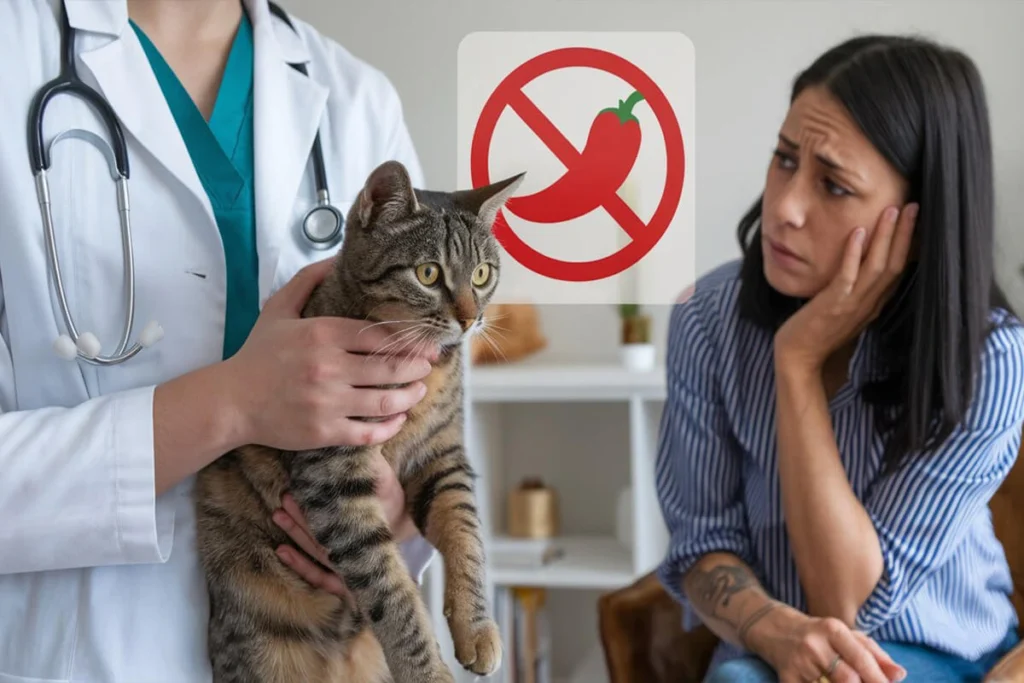
Beyond capsaicin, many spicy dishes contain ingredients that are outright toxic to cats, such as garlic, onions, and excessive salt. Even a small amount of these can cause serious health problems, including digestive upset, dehydration, and, in severe cases, poisoning. Since cats have a much smaller body size than humans, even a little bit of a harmful ingredient can have a significant effect.
Veterinarians also warn that feeding cats spicy foods regularly can lead to long-term digestive problems. Spicy and heavily seasoned foods can disrupt the delicate balance of a cat’s stomach, leading to chronic gastrointestinal issues such as inflammation, irritation, or pancreatitis. If a cat accidentally consumes spicy food and shows signs of distress, pet owners should monitor them closely and consult a veterinarian if symptoms worsen.
Safe Alternatives to Spicy Foods
If a cat shows curiosity about spicy foods, plenty of safe and healthy alternatives can satisfy its interest without causing harm. Cats react more to the smell and warmth of food than to the spice itself, so offering appealing but safe options keeps them happy and healthy.
Healthy alternatives include:
- Cooked, unseasoned meats – Serve plain chicken, turkey, beef, or fish without spices, salt, or sauces to provide a natural and nutritious treat.
- Commercial cat treats – Choose treats designed with strong aromas to attract cats while keeping their diet safe and balanced.
- Warm food – Gently heat regular wet food to enhance its scent and appeal, making it more enticing without introducing harmful ingredients.
- Catnip or silvervine – Give cats sensory stimulation with catnip or silvervine, providing an enjoyable alternative to human foods.
Offering these safe options satisfies a cat’s curiosity while protecting its digestive system from irritation or toxicity. options, owners can satisfy their cats’ curiosity without exposing them to the dangers of spicy foods.
If your cat eats spicy food, here are some steps you can take
IIf a cat eats spicy food by accident, act quickly to minimize discomfort and potential health risks. Since cats cannot taste spicy food but still feel its irritating effects, monitor their reaction closely. Some cats may take a small lick or bite, then immediately back away, drooling, shaking their head, or sneezing. Others may consume more, leading to digestive issues like vomiting or diarrhea.
What to Do If a Cat Eats Spicy Food
- Offer fresh water – Spicy food can cause mouth irritation, so provide fresh water to help ease discomfort. Avoid milk, as most cats are lactose intolerant.
- Watch for symptoms – Monitor for vomiting, diarrhea, excessive drooling, pawing at the mouth, or lethargy. Contact a veterinarian if symptoms persist.
- Keep the cat comfortable – Create a quiet, stress-free environment where the cat can recover.
- Prevent future incidents – Keep spicy food out of reach and educate household members about the dangers of feeding cats spicy food.
If a cat shows severe symptoms like difficulty breathing, swelling, or extreme distress, seek veterinary attention immediately. The best way to protect a cat from spicy food is through prevention—keep human meals secure and offer safe, cat-friendly treats instead. instead.
Conclusion
Cats may seem curious about spicy food, but their bodies cannot handle it. If you have ever wondered, can cats taste spicy food? the answer is no. They lack the taste receptors to detect spiciness like humans do. However, they still feel the burning sensation from capsaicin, which can cause irritation, discomfort, and digestive issues.
A cat’s digestive system is built for meat, not spicy food. Eating spicy dishes can lead to stomach pain, vomiting, or diarrhea. Many spicy foods also contain toxic ingredients like onions, garlic, or too much salt. These can be dangerous for your cat’s health. While your cat may seem interested in your meal, it is usually because of the strong aroma, not the spice.
If your cat eats spicy food, watch for signs of distress. Symptoms may include drooling, pawing at the mouth, vomiting, or diarrhea. Provide fresh water to ease discomfort. If symptoms become severe, contact a veterinarian. Prevention is the best way to protect your cat. Keep spicy foods out of reach and avoid giving your cat anything with strong seasonings.
Instead of spicy food, offer safe alternatives. Plain, cooked meats or commercial cat treats meet their nutritional needs without harming them. Your cat deserves a diet that keeps it happy and healthy. Avoiding spicy foods helps prevent unnecessary pain or illness. Next time your cat eyes your spicy meal, remember that what excites you could harm them.
What is Rabbit Cat Food? Is is a Good Choice for Felines? Find out Now!
What’s the best Cat Food Every Owner Should Know About?
Discover the Top Dry Cat Food For a Healthy & Happy Feline.
Do Cats Really Love Cakes, Find Out Here!
Get Some Good Stuff for your Cat From Pet MD Official
